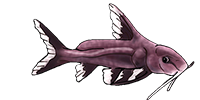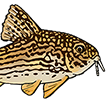Bristlenose mating
-
betta blue
- Posts: 108
- Joined: 18 Oct 2006, 00:56
- I've donated: $25.00!
- Location 1: edmonton, canada
- Interests: fish, plants, cats and dogs
Bristlenose mating
Hi Mats! You told me long time ago to put my albino female bristlenose with my male normal colored one. Been awhile, but I just put the two together. Can you advise what I need to look for if they have babies...and if they do, are the babies safe in that tank or do I need to transfer the babies to a new tank. This is totally new to me. At this point, my male is so illusive and hides all day. My female is out and about and doing a wonderful job on algae cleaning...though she loves her algae tablets.
Thx
Shar
Thx
Shar
- MatsP
- Posts: 21038
- Joined: 06 Oct 2004, 13:58
- My articles: 4
- My images: 28
- My cats species list: 117 (i:33, k:0)
- My aquaria list: 10 (i:8)
- My BLogs: 4 (i:0, p:97)
- Spotted: 187
- Location 1: North of Cambridge
- Location 2: England.
Re: Bristlenose mating
Long time no write, eh? Hope you are well...
The first thing you will notice is that the male is hiding all the time - although, as you have already stated, that may just be "guarding the cave so no other male steals it" - he won't know that he's alone in the tank.
Second, more definitive showing is the appearance of little tiny bristlenoses all over the tank. Most likely, they will be brown, but it does depend on the dad's lineage - he may in himself have albino genes, in which case 75% of the fry will be brown, and 25% will be albino.
Edit: I moved this to the Loricariidae section.
--
Mats
The first thing you will notice is that the male is hiding all the time - although, as you have already stated, that may just be "guarding the cave so no other male steals it" - he won't know that he's alone in the tank.
Second, more definitive showing is the appearance of little tiny bristlenoses all over the tank. Most likely, they will be brown, but it does depend on the dad's lineage - he may in himself have albino genes, in which case 75% of the fry will be brown, and 25% will be albino.
Edit: I moved this to the Loricariidae section.
--
Mats
- Suckermouth
- Posts: 1609
- Joined: 28 Nov 2003, 14:29
- My images: 17
- My cats species list: 22 (i:0, k:0)
- My aquaria list: 2 (i:0)
- My BLogs: 6 (i:0, p:237)
- Spotted: 14
- Location 1: USA
- Location 2: Washington, DC
Re: Bristlenose mating
I'll agree with Mats, a hiding male is a good sign. IME with my male Ancistrus, he is more likely to prowl around the tank when he's not caring for eggs, unlike other loricariids which hide at all times no matter what. Whether or not the babies are safe depend on the presence of any other fish. Ancistrus parents won't harm young Ancistrus, but certain fish may find them a tasty snack. Because the male usually takes care of the young until the reach the juvenile phase, Ancistrus young are fairly easy and straightforward to take care of, in that they are just like miniature adults.
And sorry, Mats you made a mistake with the resulting offspring for this cross as well! It'll be either all brown if the father is just a normal brown fish, or half brown and half albino if the father has the albino gene. The only way to get the 3:1 (75% to 25%) ratio is to have two brown fish that both have the albino allele. The article I'm writing will hopefully make it clear. It's mostly written now, but I need to make some figures.
And sorry, Mats you made a mistake with the resulting offspring for this cross as well! It'll be either all brown if the father is just a normal brown fish, or half brown and half albino if the father has the albino gene. The only way to get the 3:1 (75% to 25%) ratio is to have two brown fish that both have the albino allele. The article I'm writing will hopefully make it clear. It's mostly written now, but I need to make some figures.
- Milton Tan
Research Scientist @ Illinois Natural History Survey
Research Scientist @ Illinois Natural History Survey
- MatsP
- Posts: 21038
- Joined: 06 Oct 2004, 13:58
- My articles: 4
- My images: 28
- My cats species list: 117 (i:33, k:0)
- My aquaria list: 10 (i:8)
- My BLogs: 4 (i:0, p:97)
- Spotted: 187
- Location 1: North of Cambridge
- Location 2: England.
Re: Bristlenose mating
Yes, I missed the point about "what to do with the babies". As long as there are no predators in the tank, I'd just leave them in with mum and dad. You may want to feed them some softened food (such as blanched [quickly boiled] or frozen courgette/zucchini) for the first few days, until they get used to eating harder forms of vegetables. It doesn't take long. I can't get rid of my bristlenoses, so I don't "try to make as many as possible", which means I just drop in the same food whether I have new fry or not.Suckermouth wrote:I'll agree with Mats, a hiding male is a good sign. IME with my male Ancistrus, he is more likely to prowl around the tank when he's not caring for eggs, unlike other loricariids which hide at all times no matter what. Whether or not the babies are safe depend on the presence of any other fish. Ancistrus parents won't harm young Ancistrus, but certain fish may find them a tasty snack. Because the male usually takes care of the young until the reach the juvenile phase, Ancistrus young are fairly easy and straightforward to take care of, in that they are just like miniature adults.
Doh!And sorry, Mats you made a mistake with the resulting offspring for this cross as well! It'll be either all brown if the father is just a normal brown fish, or half brown and half albino if the father has the albino gene. The only way to get the 3:1 (75% to 25%) ratio is to have two brown fish that both have the albino allele. The article I'm writing will hopefully make it clear. It's mostly written now, but I need to make some figures.
-
PeterUK
- Posts: 125
- Joined: 18 Sep 2008, 02:41
- My cats species list: 10 (i:1, k:0)
- Location 2: Bexley
Re: Bristlenose mating
I have had 2 lots of BN babies come out of the 'woodwork' in the last few days (normal and albino)
I feed them exactly the same as the adults, in fact the only thing I do any different is larger and more frequent water changes due to having approx 100+ extra 'little poo machines' doing what poo machines do ! ! !
When there are no babies in the tank i do a 30% water change once weekly, once the babies start feeding and pooing i do a 75% water change every other day using aged HMA water.
Sometimes I have to do a major series of water changes like today. The water looked like someone had poured a pint of milk in the tank, I did a 75% WC, refilled the tank with aged HMA water then did another immediate 75% WC, left the tank for 30 mins and then did the same again.
So that was THREE 75% WC in about 45 minutes which may sound to much but it works for me.
The last time I had BN babies (few months ago) I raised 134 to an average size of 1.5in before selling them using the same method.
I feed them exactly the same as the adults, in fact the only thing I do any different is larger and more frequent water changes due to having approx 100+ extra 'little poo machines' doing what poo machines do ! ! !
When there are no babies in the tank i do a 30% water change once weekly, once the babies start feeding and pooing i do a 75% water change every other day using aged HMA water.
Sometimes I have to do a major series of water changes like today. The water looked like someone had poured a pint of milk in the tank, I did a 75% WC, refilled the tank with aged HMA water then did another immediate 75% WC, left the tank for 30 mins and then did the same again.
So that was THREE 75% WC in about 45 minutes which may sound to much but it works for me.
The last time I had BN babies (few months ago) I raised 134 to an average size of 1.5in before selling them using the same method.
Everything we do echo's in Eternity
-
betta blue
- Posts: 108
- Joined: 18 Oct 2006, 00:56
- I've donated: $25.00!
- Location 1: edmonton, canada
- Interests: fish, plants, cats and dogs
Re: Bristlenose mating
Thank you everyone! Great information! I'm looking forward to them having babies and guess will know then if the male has an albino gene.
Thx again,
Shar
Thx again,
Shar




